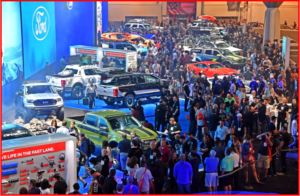The Specialty Equipment Manufacturers Association, aka SEMA, has filed a petition in federal appellate court to require the government to allow replica car manufacturers to immediately begin production.
Another Agency run by President Trump’s political appointees is allegedly defying a 2015 law – the Fixing America’s Surface Transportation Act (FAST Act) – passed by Congress to let low-volume automakers sell up to 325 replica cars each year that resemble production vehicles manufactured at least 25 years ago.
The FAST Act set a deadline of December 4, 2016, for the U.S. Department of Transportation’s National Highway Traffic Safety Administration (NHTSA) to issue any necessary regulations to implement the law. The agency has taken no action.
Prior to the FAST Act, the United States had one regulatory system for automakers. This was established in the 1960s and written for (and/or by automakers via lobbyists) companies that mass-produce vehicles.
The lack of flexibility – in SEMA’s and many critics’ views – precluded smaller businesses from manufacturing turn-key vehicles. With a potential lucrative market for certain replica vehicles under the new law, companies made investments and took customer orders on the assumption that sales could begin in late 2016.
However, NHTSA has failed to issue regulations or undertake any other action allowing the small automakers to produce and sell vehicles as permitted by law.
“SEMA warned NHTSA in 2018 that it would file suit if companies could not begin production of turnkey cars as authorized by the FAST Act,” said SEMA President and CEO Christopher J. Kersting.
He claimed that SEMA has made multiple efforts to work collaboratively with NHTSA for more than three and a half years. “Consequently, companies have not hired workers, businesses have lost money, and consumers have been denied their rights to purchase replica cars,” said SEMA.
Vehicles produced under the FAST Act will be current model-year clean cars. The U.S. Environmental Protection Agency and the California Air Resources Board established guidelines and regulations to confirm that the engine packages to be installed will meet current emissions standards.
The replica car provision was designed to be relatively simple for NHTSA to apply, because it is an extension of kit car production regulations that the agency has used for decades.
However, the FAST Act requires NHTSA to “issue such regulations as may be necessary” to implement the law, the agency also has other options such as issuing a guidance document that will allow production to begin immediately. SEMA has asked the court to compel NHTSA to act.



Pingback: SEMA Lawsuit – NHTSA Issues Draft Replica Car Rule | AutoInformed